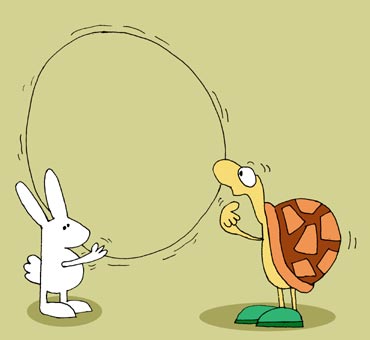Photographs: Illustrations by Uttam Ghosh Gyancentral.com
Students generally have adequate clarity about how to prepare for the Quantitative, Data Interpretation, Logical Reasoning, and General Awareness sections of competitive examinations; the preparation for Group discussions and Personal Interviews as the course of study for these sections is well structured.
However the course of preparation for the Verbal section more often than not is without clarity, structure, or direction.
Most students merely satisfy themselves by solving as many questions in verbal as possible and then hope for the best in the test itself! There is no magic bullet that will transform one's verbal aptitude overnight, the unstructured ways of working only adds to the uncertainty about verbal.
And precisely for this reason the decisive part of the test becomes the verbal section. A simple truth about the students taking the CAT and similar examinations is that the number of students good in mathematics is more than the number of students good in verbal.
The CAT then essentially becomes a competition among those who are good in mathematics vying for the best verbal scores.
Click NEXT to continue
Courtesy:

Overall percentiles are significantly influenced by verbal scores
Image: Overall percentiles are significantly influenced by verbal scoresRather than analysing such statistics further to reinforce the importance of the verbal section, one should get down to systematically tackling this aspect and not let one's preparation in mathematics and DI go waste because of verbal.
If you are good in mathematics and DI, you must spend a lot of time preparing for verbal rather than become better and better in your strong areas.
If you are good at verbal, make sure that you spend much more time in quant and DI in order to save the exam and your chances rather than strengthen your strengths and perpetually blame the weak area for your failure.
Click NEXT to continue

Practice may enhance confidence
Image: Practice may enhance confidenceAnd the student plunges headlong into solving as many questions as possible of all these different types, without realising that some of these question types may need no practice at all.
They may only demand time or an intense application of the mind to solve them. I would cite Paragraph Jumbles as an example of such types.
These questions need sufficient time and several readings of the sentences rather than the experience of having solved innumerable jumbled paragraphs during practice.
Anyone who applies his/her mind to the given sentences and spends sufficient time arranging the sentences can get the sequence right -- practice may enhance the confidence one has in dealing with these questions rather than accuracy.
This is not to discount the importance of practice of solving verbal questions but only to emphasise that the preparation for verbal ability must be done with absolute clarity about what skill exactly is being tested by the particular question type.
Click NEXT to continue
General approach to verbal preparation is the same
Image: General approach to verbal preparation is the same- Reading Comprehension
- Verbal Logic/Reasoning
- Grammar
- Vocabulary
All the questions in any competitive test fall under one of these areas. Sometimes, equal importance is attached to each area, though some examinations lay greater emphasis on a particular area.
For example, almost 50 percent of the questions in the verbal section in the CAT are reading comprehension questions.
The remaining 50% of the questions give equal importance to the other areas. XAT is reasoning and vocabulary intensive. Thus, you may have to fine tune your preparation according to the specific emphasis of an exam; however, the general approach to verbal preparation is the same for all exams. This chapter throws light on this aspect of the preparation.
Though it is essential to solve sufficient number of questions in each of these areas during your practice, it is far more important to realise that these areas are not watertight compartments or different topics like Geometry and Algebra.
Click NEXT to continue
Verbal needs to be approached in totality as well
Image: Verbal needs to be approached in totality as wellVerbal is essentially one area, and a unified area. Reading skill (comprehension), reasoning, vocabulary, and grammar are all indicators of one's proficiency in a language rather than different areas one can or should master separately.
Hence it is futile to try to improve your verbal aptitude by concentrating on one of these areas and ignoring or underplaying the others.
There are students who believe (I do not know how far it can be true) that they are good in reasoning but not in vocabulary, or grammar, or reading comprehension for that matter.
Doesn't one come across vocabulary items in a reasoning question? Does not one have to understand the grammatical structure (though not technically) in order to comprehend correctly? This unified nature of verbal (language) needs to be borne in mind when one begins one's preparation for verbal.
Hence, even when your study material or training schedules treat vocabulary, grammar etc. as separate units or types or topics, you have to understand that it is done only for convenience and for imparting a superficial structure to your efforts rather than treat them as separate areas.
What it implies is, while you spend enough time to solve questions in each of these areas in order to improve your underlying aptitude to solve these questions, verbal needs to be approached in totality as well.
Hence, it is necessary to pay attention to the vocabulary items that you encounter in a reading comprehension passage at that very moment, pay attention to the complex grammatical structures in a reasoning passage, work out the line of reasoning that helps you arrive at a particular answer in a comprehension passage etc., as you solve questions of these different types. At least part of the preparation must be undertaken this way.
Click NEXT to continue
Verbal skills have long-term relevance
Image: Verbal skills have long-term relevanceAnother point to bear in mind about verbal is that the efforts you spend in this area and the improvement in skill/proficiency that you may acquire in verbal are never wasted.
To an extent, geometry stops being useful to you in life at some point or the other unless you are engaged in jobs that require geometry.
This can be said about most things that you learn either in your academic pursuits or during the preparation for competitive examinations. You can ponder over whether verbal skills (vocabulary, reading skills etc.) stop being useful at any point in your life.
Aren't impressive communication skills (effective vocabulary and clarity of thought and expressions) relevant and significant wherever you are, whatever career you are in, or even in your social life?
The language skills that you acquire or improve through your study and practice for a competitive examination will not stop being useful to you even if you do not get into a b-school. Such an attitude and approach to verbal will take the stress off your preparation for verbal.
You will learn to like words (vocabulary) or passages (abstract reading comprehension passages) because they are useful instruments for a larger goal.
A youngster with passion and communication skills is a delight for everyone else. A youngster with great passion and poor communication skills is confusing to everyone else.
When you look at verbal ability from this perspective, difficult words (ideas) and abstract passages become challenges worth mastering! In short, verbal preparation ought not to be merely from the exam point of view.
Click NEXT to continue
Develop a reading habit
Image: Develop a reading habitWe have been told ad nauseam about the importance of the reading habit. Yet, we are unable to develop the reading habit.
More than a lack of desire to read, lack of time constrains youngsters from developing the reading habit. If it is true about you and you have realised it, half the battle is already won.
Earmark fifteen minutes or so every day before going to sleep to read a few pages from a good book, and watch how the habit develops! It is very important in the beginning to read what you like for the habit to set in.
If you like thrillers, read thrillers. If you like romantic fiction, read it. If you like physics, read physics. Unless you read what you like, the habit will never set in. Once you get the reading habit, it is easier to get into the preparatory mode for competitive examinations by moving on to difficult, unfamiliar, abstract and varied stuff little by little.
Some of you may be worried about the lack of speed in reading, especially in the passages that you solve.
Practice speed reading (in this context, merely reading fast -- not worrying about speed-reading techniques etc.) for at least fifteen minutes with the newspaper (essentially easy stuff). To begin with, when you are trying to read the newspaper very fast, ignore the loss of comprehension and concentrate on just improving your speed.
You will be surprised to find, in a very short while, that improving the speed has not affected your comprehension adversely at all.
On the contrary, you are able to gain better comprehension and able to process greater amounts of text by merely reading fast. That will be the first step towards improving your speed. All experiments with speed reading must be done with easy text -- in which vocabulary and grammar (sentence structure) do not pose challenges.
The greater speed that you have acquired in reading easy text will automatically improve your speed with more difficult text.
If you have improved your speed with easy text from, say, 250 to 500 words per minute, your speed with difficult text may improve from, say, 150 words per minute to 200 words per minute. With more and more practice the speed at which you can process text will improve phenomenally.
Click NEXT to continue
Make verbal learning an experience rather than exercise
Image: Make verbal learning an experience rather than exerciseComprehension of the text one reads is not so much related to speed as to one's concentration and proficiency in the language (mastery of vocabulary and grammatical structures); hence, it is necessary to consciously work towards improving your vocabulary and your comfort with complex sentence structures. Work slowly but steadily.
Do not overwhelm yourself with Plato or Jean Paul Sartre to begin with. Pick up a 400 to 500 word long essay (even half the length is all right) on abstract and difficult topics. Spend an hour on it -- reading, analysing (using the dictionary to understand unfamiliar words), and assimilating the information.
Break long and complex sentences into constituent idea units and comprehend such sentences in parts first; the whole will automatically make sense.
Make verbal an experience rather than merely an exercise in solving questions.
The writer should suggest until at least three months before the exam spend half the time you devote to verbal working in the above manner -- making a difference to your language as a whole, and half the time solving all kinds of questions.
About two/three months before the exam you can start spending most your time solving questions, but not forgetting to work intensely on your reading and comprehension skills whenever possible.
Click NEXT to continue
Use the dictionary extensively to learn new words
Image: Use the dictionary extensively to learn new wordsImproving your vocabulary should ideally take a two-prong approach. The first is to ignore the exam and to treat improving your vocabulary as an end in itself. The second is to learn vocabulary purely from the point of view of the exam.
The first approach is not a time-bound exercise. It is undertaken not with the exam in mind, but with the honest purpose of improving one's vocabulary, and thereby one's reading skills, proficiency in the language, and most importantly one's communication skills.
One must realise that one's communication skills are, as a matter of fact, equal to the number of words one has mastered. Your ability to express your thoughts clearly and precisely, and even your ability to think clearly and precisely depends on the number of words that you know.
As Wittgenstein remarked, "The limits of my language mean the limits of my world." Realising this truly in oneself motivates one to earnestly work towards mastering new words and new ideas. That is the non-exam-specific approach. Towards this end, you must read widely, and use the dictionary extensively to learn new words.
Any unfamiliar word that you come across is a candidate for learning -- for the simple reason that it is unfamiliar.
Students find learning new words rather cumbersome. Memory is a huge problem. We are not able to retain the words we learn; we forget the words themselves; we forget their meanings more easily. Altogether, it looks like a futile exercise, and boring too. There are solutions to all these problems.
Click NEXT to continue
Refer to pronunciation guide
Image: Whenever you come across a new word and look it up in a dictionaryIf we slightly change the way we learn new words all the above problems can be addressed very easily, giving us tangible results in quick time.
We generally note down the new words and their meanings and learn them by rote. This method gives rise to the above problems: inadequate retention of the words themselves and their meanings and the inability to use the new word in speech or writing.
Remember, the functions of a word as an instrument of communication are: 1. to speak, 2. to write, 3. to think.
The change suggested here in the way you learn new words takes account of these functions:
To Speak
You must know how the word is pronounced. Hence whenever you come across a new word and look it up in a dictionary and before anything else learn its pronunciation.
Most dictionaries give the pronunciation of the word immediately after it. Some dictionaries (good ones) use symbols or the IPA (International Phonetic Alphabet) to show its pronunciation.
Web based dictionaries may even have pronunciation audio. Use all this effectively to master the correct pronunciation of the word. If the symbols are unfamiliar look at the first few pages of the dictionary -- the symbols are always explained as 'guide to pronunciation.'
Remember, unless you know the correct pronunciation, your confidence in relation to that word will always be low, leading to a hesitation to speak the word and thus it slips out of your memory more easily. You will feel confident about the word if you pronounce it correctly (say loudly a few times). In turn, it enhances your memory and retention. You will get the feeling that you now own that word.
Try it with this new word: chatoyant -- pronunciation is shuh-TOI-uhnt . Read this loudly to yourself a few times. In IPA, the symbols for 'chatoyant' will look like this: /ʃa.twa.jɑ̃/
To Write
To be confident to write a word, you must know its spelling. Pay attention to the spelling of the word as you learn its pronunciation. Learning the spelling is easy- but do pay attention to the combination of alphabets and notice any peculiarity (e.g., weird is spelt "ei" rather than "ie" etc.)
When you have done the above two things well, before rushing to find its meaning, you will experience that you have learnt the word is now part of your vocabulary. The chances of forgetting it later are reduced, because the new word is now yours. Your vocabulary has now improved.
Click NEXT to continue
Try to read as much as possible about the word itself
Image: Try to read as much as possible about the word itselfThe meaning is the next thing. In order to retain the meaning of the word well and to be able to think with it later and to be able to use it in your writing or speech, you need to slightly change the way you learn its meaning.
The meaning of 'chatoyant' is having changeable lustre; twinkling. When you have learnt the meaning this way it hardly helps in understanding the word well. Hence look at the context in which the word occurs. And learn the word along with a bit of the context in which it occurs and remember it as a phrase (at least two words).
For example, do not remember 'chatoyant', remember "chatoyant silk". When you remember it as "chatoyant silk" the meaning of the word becomes much clearer and remains in memory for long time (perhaps, forever!) and you will be able to use the word at least in one context with confidence. Memory does not fail you. The word silk will trigger the word back into your memory.
The above method, if diligently adhered to, will give quick and great results.
Also, try to read as much as possible about the word itself -- its root meaning, etymology, history etc. A casual reading of such details about the word itself will go a long way in improving retention.
For example, read this information related to "chatoyant"
Origin
Chatoyant's poetic origin lies in the French chatoyer, "to gleam like a cat's eyes," from the French chat meaning "cat"
Quotes
Chatoyant is that kind of white which the eye of a cat assumes in the dark: The translator observes, truly, that there is no English word for it; the idea is that of a semi-transparent whiteness. -- M. de Foucroy.
Its chatoyant, iridescent colours suggest the fancy that it might have had its birth in the crystallisation of some magnificent aurora. -- R.G. Taber.
Now you know the word much better. A few words learnt this way regularly will go a long way in improving your vocabulary over time.
If you are making a note of this word (building your own wordlist) the entry in your notebook may look like this:
chatoyant -- shuh-TOI-uhnt - "chatoyant silk" -- having a changeable colour or lustre/ twinkling
Click NEXT to continue
Memorise as many words as possible
Image: Memorise as many words as possibleRoot lists, Wordlists, flashcards, books (there are innumerable books in the market) are hugely useful in learning vocabulary for an exam. You must memorise as many words as possible from such sources.
It is better to do such mechanical work as close to the exam as possible for a few hours at a stretch.
This way your memory remains fresh at the time of the examination, and if those words are not there in the examination, you can at least be satisfied that you haven't invested too much time in learning useless words, which you will anyhow soon forget.
The general study of vocabulary must go on always, complemented by the exam-specific method during your preparation for competitive examinations.
You must also solve as many vocabulary related questions as possible.
Learn the common areas of errors
Image: Learn the common areas of errorsThe study of grammar for a competitive examination is far easier than the study of vocabulary and far less intimidating than most students feel about it.
If you are good reader (the reading habit), the grammatical structures of a language are instinctively mastered without actually being able to distinguish between the subject and the object case of a pronoun (rules). Hence continue your general reading of everything possible and as much as possible.
Most coaching institutes have excellent material available for grammar. Principles tested in competitive exams generally follow a pattern and are based on the common errors in English.
The best way to prepare for grammar is to first learn the principles generally tested in the examination -- mentioned in the chapter on grammar -- and then solve as many questions as possible. During practice do not worry too much about your accuracy to begin with.
Learn backwards, i.e., solve questions, make mistakes, and learn all the principles from the explanations to these answers.
The point is: Do not try to become grammarians while preparing for competitive examinations. Learn the common areas of errors. Learn largely by solving questions. Also, refer to the introduction to the chapter on grammar questions in this book.
Click NEXT to continue
How to crack Verbal Logic problems
Image: Verbal Logic tests your ability to reason as per the rules of reasoning in an objective wayThese questions test your comprehension and analytical skills specific to the given information/situation. The difference between Verbal Logic and Verbal Reasoning is that Verbal Logic tests your ability to reason as per the rules of reasoning in an objective way (in a formulaic way) and requires ignoring all prior knowledge.
Verbal reasoning on the other hand requires comprehension of the data as the data is generally understood in daily life and the ability to apply principles of reasoning to make certain decisions. Reading Comprehension questions as they appear in competitive examinations, especially the CAT and XAT, are more Verbal Reasoning questions than reading comprehension per se.
Logical set theory questions symbolises Verbal Logic questions. The data "All cats are dogs" is analysed as All C's are D's ignoring whatever one may know about cats and dogs.
You can prepare for Verbal Logic questions by first learning the few principles related to Verbal Logic and then by solving questions regularly.
Once you have got the knack of solving these questions it is better not to go on practicing and waste time. Keep solving a few questions so that you remain in touch with these questions and then spend your valuable time in other question types or in generally improving your verbal skills.Click NEXT to continue
Devise your strategy according to practice and application of the mind
Image: Devise your strategy according to practice and application of the mindA large variety of question types exists in Verbal Reasoning. The most structured ones are called Critical Reasoning questions.
The methods to solve these questions are discussed in some detail at the beginning of each chapter in this book. Reading comprehension, Paragraph Completion, Jumbled Paragraphs etc. are examples of Verbal Reasoning questions.
Verbal Reasoning questions, whichever type they may be, test your comprehension, analytical, reasoning, and decision-making skills.
What that means immediately is that generally they are time consuming. They require active reading of the given data and good comprehension of it. Though the familiar types are discussed in this book, new and unfamiliar types can always appear in an exam. In all reasoning questions make sure that you have understood the instructions well before attempting the questions.
In fact, the verbal reasoning questions keep you on your toes in the exam.
In most of these questions, practice is of utmost importance.
And a few like paragraph jumbles are left to the careful application of the elementary reasoning skills that all of us already possess. But, some other question types, say, Critical Reasoning questions may be high-analysis, high-I.Q. questions. Devise your strategy accordingly about practice and application of the mind.
The author Sujit Kumar is faculty for Verbal Ability in CPLC, Mumbai. The following is an extract from his book 'Verbal Ability for the CAT' published by Pearson Education.
















Comment
article